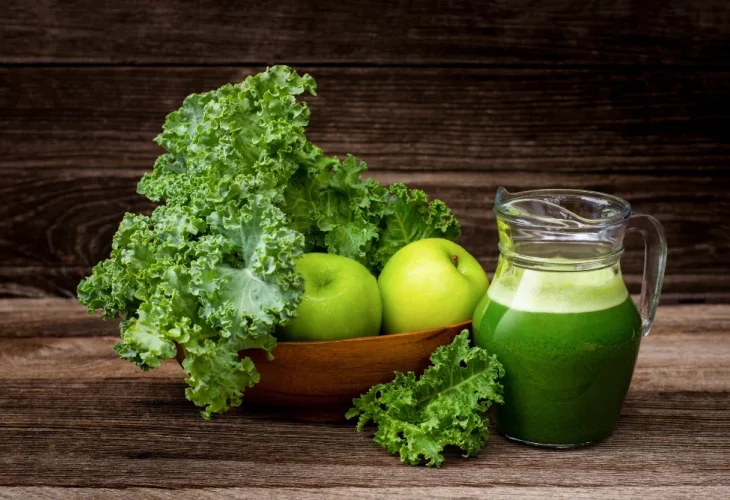Decoding 'Superfoods': Myths vs. Reality in Weight Loss
'Superfoods' are a trendy addition to our daily diet, but can they truly help us shed pounds? Let's explore the myths and truths about 'superfoods' and weight loss.
 Kale - Helps Reduce Snacking Cravings Between Meals
Kale - Helps Reduce Snacking Cravings Between MealsIn our quest for healthier and slimmer lifestyles, many of us seek out 'superfoods' to aid in our weight loss mission. The term 'superfoods' refers to foods exceptionally rich in nutrients that can improve our overall health and support weight loss efforts. But are all the claims about these foods true?
Kale
Kale is a leafy green vegetable from the cruciferous family, like cabbage, cauliflower, and broccoli. Kale has earned its 'superfood' status because it's high in vitamins, minerals, and dietary fibers. It's rich in Vitamin K, Vitamin C, iron, and calcium, and low in calories—everything you need to feel full without consuming too many calories.
Truth: Kale indeed contains numerous nutrients that can contribute to feeling full and reduce the need for snacking between meals. Studies show that fiber consumption aids in preventing weight gain by promoting satiety and stable blood sugar levels.
Myth: There's no scientific evidence that kale itself leads to weight loss. Weight loss is a complex process influenced by factors like diet, exercise, and metabolism.
Quinoa
Quinoa is a grain rich in proteins, fibers, vitamins, and minerals. It contains all essential amino acids, making it a complete protein source.
Truth: Due to its high protein content, quinoa can contribute to prolonged satiety and aid in muscle mass maintenance during dieting.
Myth: Quinoa doesn't have a secret ingredient that causes rapid weight loss. Like any food, quinoa needs to be part of a balanced, varied diet.
 Quinoa can contribute to prolonged satiety
Quinoa can contribute to prolonged satietyChia Seeds
Chia seeds are rich in Omega-3 fatty acids, dietary fibers, proteins, and minerals like calcium and iron.
Truth: Thanks to their high fiber content, chia seeds can aid in satiety and support proper digestion. Omega-3 fatty acids contribute to heart health and reduce inflammation.
Myth: Despite their nutritional benefits, there's no proof that chia seed consumption alone will lead to weight loss. Like all superfoods, they should be part of a balanced diet.
 Chia seeds are rich in Omega-3 fatty acids, dietary fibers, proteins, and minerals
Chia seeds are rich in Omega-3 fatty acids, dietary fibers, proteins, and mineralsGreen Tea
Green tea contains caffeine and catechins, antioxidants that some studies suggest might help speed up metabolism.
Truth: Caffeine and catechins may contribute to an increased metabolic rate and fat burning in the body. Research indicates that green tea consumption may support moderate weight loss when combined with a balanced diet and exercise.
Myth: Drinking green tea alone will not lead to significant weight loss. Its impact is limited and relies on other lifestyle factors like overall lifestyle.
 Speeds up the body's metabolism
Speeds up the body's metabolismGoji Berries
Goji berries are berries native to China, rich in antioxidants, vitamins, and minerals.
Truth: Goji berries contain antioxidants that may help maintain cell health and reduce inflammation. They are low in calories and can be part of a healthy diet.
Myth: There's no scientific evidence that goji berries on their own will lead to weight loss. Like any superfood, they should be part of a diverse and balanced diet.
 No scientific evidence that goji berries lead to weight loss on their own
No scientific evidence that goji berries lead to weight loss on their ownAdditional Myths – Regarding Non-'Superfoods'
Coconut Oil
Coconut oil has recently taken a place among superfoods, with many claiming its ability to aid in weight loss.
Truth: Coconut oil contains medium-chain fatty acids (MCTs) that can be digested differently from other fats, with claims linking these fatty acids to increased metabolism.
Myth: Despite the claims, coconut oil still contains a high amount of calories and saturated fat. There isn't enough scientific evidence indicating that coconut oil significantly contributes to weight loss. Overconsumption can even lead to weight gain.
Lemon Water
Drinking water with lemon has gained popularity as a way to 'cleanse the body' and encourage weight loss.
Truth: Water is crucial for hydration, and adding lemon can provide Vitamin C and a hint of flavor.
Myth: There is no evidence that lemon water can burn fat or cause weight loss. The weight loss process is related to overall calorie balance and physical activity, not the consumption of specific drinks.
Grapefruit
Eating grapefruit is often considered a quick fix for weight loss due to claims that it contains components that boost metabolism.
Truth: Grapefruits contain Vitamin C and fibers, and some studies show that eating them can aid in moderate weight loss as part of a low-calorie diet.
Myth: Grapefruit doesn't have a secret ingredient that leads to rapid weight loss. The weight loss effects attributed to grapefruit are part of the overall impact of a balanced diet, not the grapefruit itself.
Bottom Line
Like everything in life, there are no magic solutions. It's crucial to rely on evidence-based science and be skeptical of claims that sound too good to be true. Weight loss requires a commitment to a healthy lifestyle, balanced diet, and regular physical activity. Superfoods can contribute to the process, but they don't have a miraculous effect on weight.

